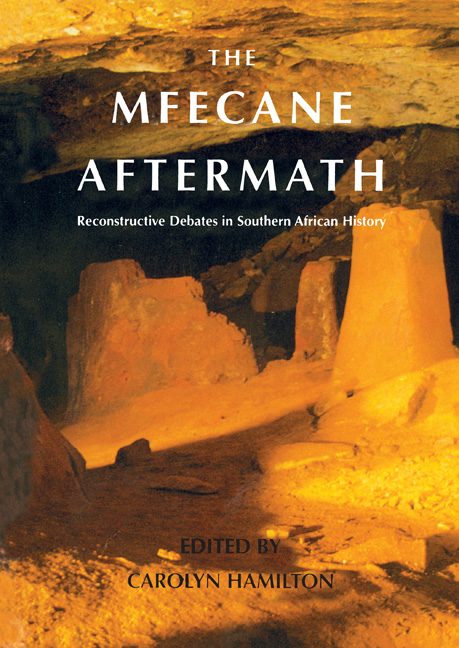Book contents
- Frontmatter
- Contents
- Maps
- Preface
- Acknowledgements
- Notes on Orthography and Names
- Contributors
- Introduction
- Part One Historiography and Methodology
- Part Two The South-Eastern Coastal Region
- Beyond the Concept of the ‘Zulu Explosion’ Comments on the Current Debate
- 5 Sources of Conflict in Southern Africa c. 1800-1830: The ‘Mfecane’ Reconsidered
- 6 Political Transformations in the Thukela-Mzimkhulu Region in the Late Eighteenth and Early Nineteenth Centuries
- 7 The Character and Objects of Chaka’: A Reconsideration of the Making of Shaka as Mfecane Motor
- 8 Matiwane's Road to Mbholompo: A Reprieve for the Mfecane?
- 9 Unmasking the Fingo: The War of 1835 Revisited
- 10 The Mfecane Survives its Critics
- Part Three The Interior
- Glossary
- Abbreviations
- Bibliographer's Note
- Bibliography
- Complete List of Papers Presented at the Colloquium
- Index
8 - Matiwane's Road to Mbholompo: A Reprieve for the Mfecane?
from Part Two - The South-Eastern Coastal Region
Published online by Cambridge University Press: 31 May 2019
- Frontmatter
- Contents
- Maps
- Preface
- Acknowledgements
- Notes on Orthography and Names
- Contributors
- Introduction
- Part One Historiography and Methodology
- Part Two The South-Eastern Coastal Region
- Beyond the Concept of the ‘Zulu Explosion’ Comments on the Current Debate
- 5 Sources of Conflict in Southern Africa c. 1800-1830: The ‘Mfecane’ Reconsidered
- 6 Political Transformations in the Thukela-Mzimkhulu Region in the Late Eighteenth and Early Nineteenth Centuries
- 7 The Character and Objects of Chaka’: A Reconsideration of the Making of Shaka as Mfecane Motor
- 8 Matiwane's Road to Mbholompo: A Reprieve for the Mfecane?
- 9 Unmasking the Fingo: The War of 1835 Revisited
- 10 The Mfecane Survives its Critics
- Part Three The Interior
- Glossary
- Abbreviations
- Bibliographer's Note
- Bibliography
- Complete List of Papers Presented at the Colloquium
- Index
Summary
The small and possibly smug world of precolonial southern African historians was rudely shattered in 1983 by the appearance of a brilliant polemic by Julian Cobbing entitled The Case Against the Mfecane'. In a series of increasingly provocative papers and lectures, Cobbing challenged the existing conventional wisdom, first put forward by John Omer-Cooper in 1966, that the Mfecane was a ‘revolutionary process of change from a single centre’, namely the rise of the Zulu kingdom. Omer-Cooper was much concerned to stress the Afrocentrism of his perspective. The Mfecane, he maintained, gave the lie to the view ‘that African societies had no record of autonomous development … [The Mfecane] was essentially a process of social, political and military change, internal to African society and taking place with explosive rapidity.’
Cobbing not only rejected Omer-Cooper's definition of the Mfecane, but he seriously questioned whether the event had taken place at all. He argued that the Mfecane was not an internally self-generated revolution occurring within northern Nguni-speaking society, but a convenient alibi, whereby succeeding generations of white historians rationalised and legitimated white seizure of black lands. The wars and dispossessions of the early nineteenth century were set in motion not by the rise of the Zulu state but by two chains of violence emanating from colonial aggression. One chain of violence, in the east, was initiated by Portuguese slave-trading from Delagoa Bay, which impacted directly on northen Nguni-speakers. Another chain of violence, in the west, was prompted by the labour needs of the Cape colony and augmented by the raiding activities of its armed and mounted surrogates, the Griqua.
It is not an exaggeration to say that the entire debate on the nature of southern African precolonial societies has been paralysed by Cobbing's intervention, and will continue to remain so until the crisis created by ‘the Cobbing hypothesis’ has been resolved. Fortunately, one of his articles has been published in an historical journal, ‘The Mfecane as Alibi: Thoughts on Dithakong and Mbolompo’, thereby making it possible for serious historical debate to commence. I will confine myself to those aspects of The Mfecane as Alibi’ which relate to my own area of specialisation, namely what became the eastern Cape/Transkei region. Much of what follows may seem negative and petty.
- Type
- Chapter
- Information
- Mfecane AftermathReconstructive Debates in Southern African History, pp. 213 - 240Publisher: Wits University PressPrint publication year: 1995

